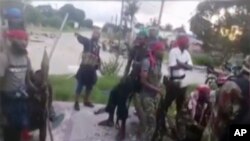Beheadings, abductions, and entire villages razed - these are the stories told by Mozambicans displaced by attacks from Islamic State-linked militants in northern Cabo Delgado province. The four-year conflict has left nearly 4,000 people dead and displaced 800,000, half the province's population. Rwandan and Southern African troops have raised hopes for an end to the conflict.
Nine-year-old Rehema Mussa is quiet and withdrawn amid the other boisterous children at a rural school in Montepuez in northern Mozambique’s Cabo Delgado province.
Mussa and her mother fled here last year after masked gunmen came to their town of Mocimboa da Praia and began killing people, including her brother.
They are some of the more than 4,000 people living in Nikuapa camp after fleeing Islamist insurgents.
“We are faced by hundreds of thousands of IDPs, internally displaced persons, who are victims of conflict around the Cabo Delgado province, especially from the areas of Mocímboa da Praia and Mueda where insurgents have actually attacked and driven out thousands of people, most of them being children," said Killen Otieno, chief operating officer with Joint Aid Management (JAM), an African aid and development group that is helping the displaced.
The displaced in Nikuapa camp tell brutal stories of how the Islamic State-linked militants attacked their villages and murdered their relatives.
Sixty-two-year-old Zara Alifa Assumane says two years ago in Mocimboa da Praia the militants killed her sister, cut off her tongue and placed her decapitated head at the family’s front door.
Assumane’s young nephew witnessed his mother’s killing from where he was hiding under the bed. But the militants discovered him and took him. He’s never been found.
Issa Pedro’s 16-year-old daughter was also abducted as they fled an attack on the town and was never seen again.
Aid group JAM’s Otieno said their stories are all too common.
“The amount of abuse, the amount of suffering, human suffering, is devastating. We are hearing stories of women who have been abducted, raped, we’re hearing stories of children who’ve been forced into the war, and girls who are missing.”
Like many in Nikuapa camp, 32-year-old Issa Amir said he doesn’t understand why self-declared Muslims are killing other Muslims in the north of this mainly Christian country.
Amir said even some of his friends and family joined the militants.
He said when the militants in 2019 came to Mocimboa da Praia they said we’d better leave because when they would come back, they would kill everyone. When they did attack, says Amir, many people were killed.
Their motives may have more to do with greed than God, says Amir, as some young men become insurgents thinking they’ll get rich.
Most people live in poverty in Cabo Delgado, despite it having Africa’s most valuable known gas fields, worth an estimated $60 billion.
Security analysts say the militants are recruiting the disaffected youth who have seen no benefit from the oil.
Jasmine Opperman is a Johannesburg-based security and terrorism consultant with the Armed Conflict Location & Event Data Project (ACLED).
She said the deployment six months ago of Rwandan and Southern African Development Community (SADC) troops has helped Mozambique fight the militants.
“Has Rwanda succeeded in pushing back the insurgents?" she asked. "That they had some degree of success cannot be negated. But to argue they’ve successfully pushed them back is a complete oversimplification. This is what the insurgents have done – splitting up into small cells, spreading the battlefield and moving -- retreat, regroup and then move back onto the battlefield area and attack.”
Mozambique, Rwanda, and Southern African nations have vowed to stop the insurgents. SADC and Rwanda have so far sent more than 3,000 troops to Mozambique.
South Africa’s military in late February said it was sending fresh troops and armored vehicles and insisted the insurgents were withdrawing.
Mozambique’s displaced, in camps like Nikuapa, can only hope the insurgents are soon defeated so they can one day return home without fear of more brutal attacks.




